2023届高考英语二轮复习: 副词 课件( 34张ppt)
文档属性
| 名称 | 2023届高考英语二轮复习: 副词 课件( 34张ppt) |  | |
| 格式 | pptx | ||
| 文件大小 | 2.7MB | ||
| 资源类型 | 教案 | ||
| 版本资源 | 通用版 | ||
| 科目 | 英语 | ||
| 更新时间 | 2023-03-13 19:41:35 | ||
图片预览

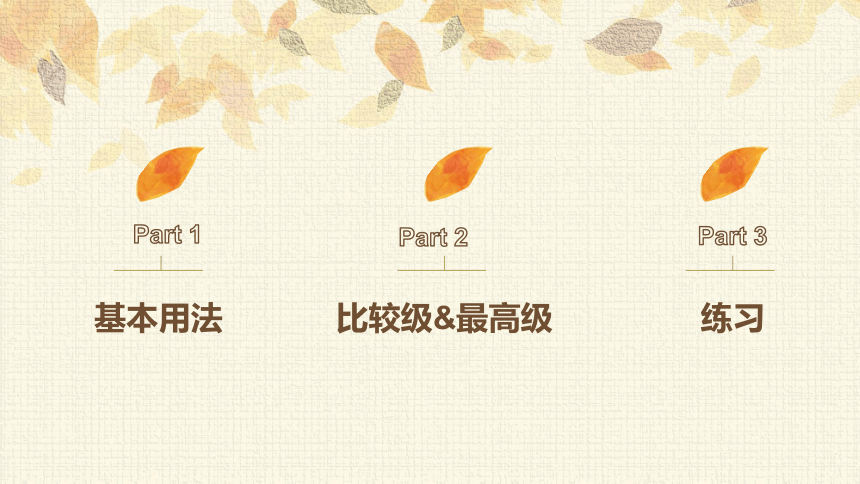


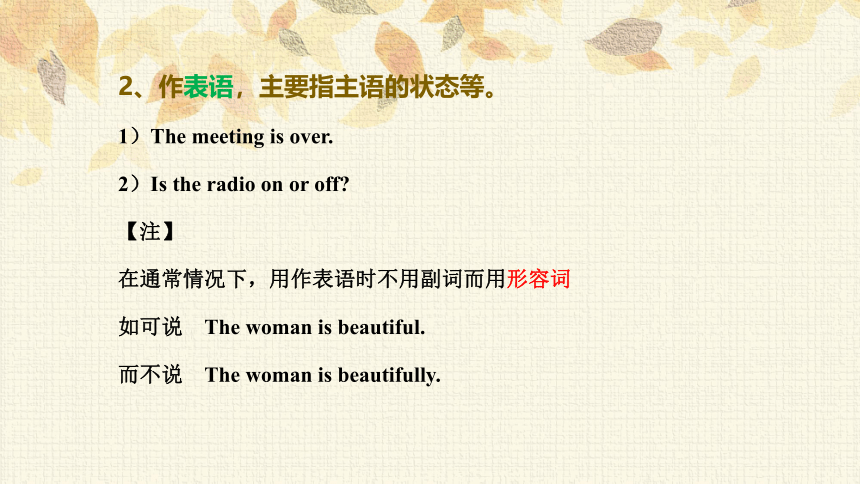
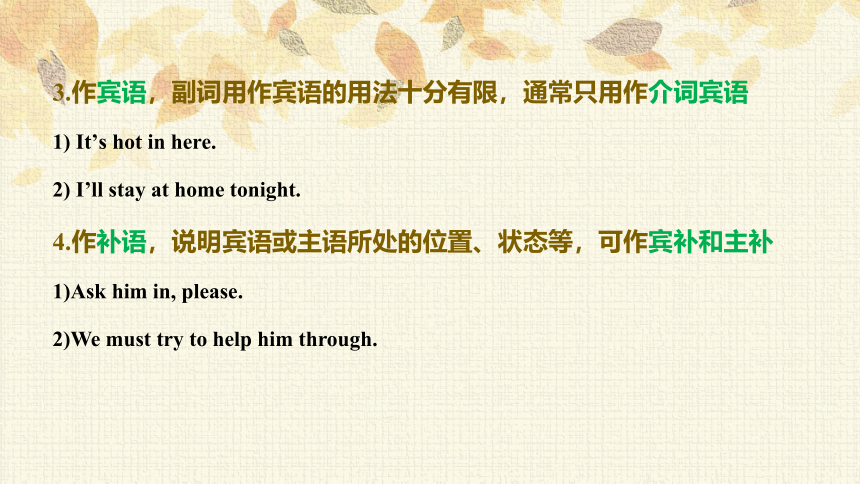
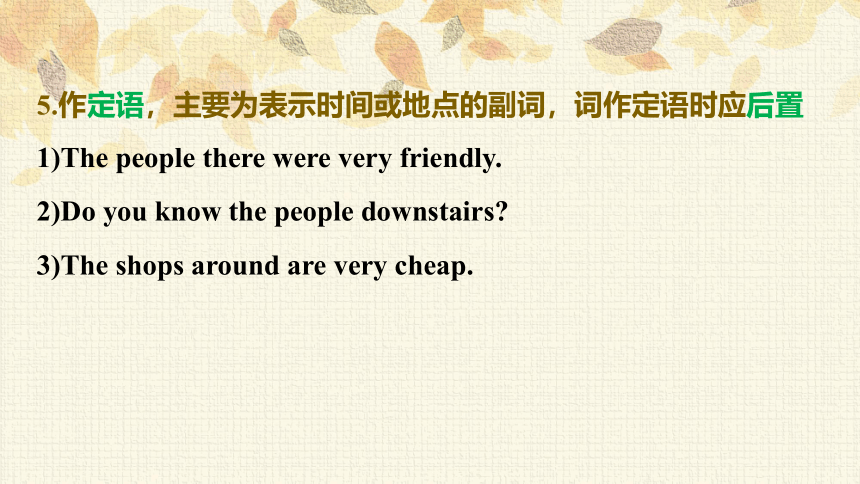

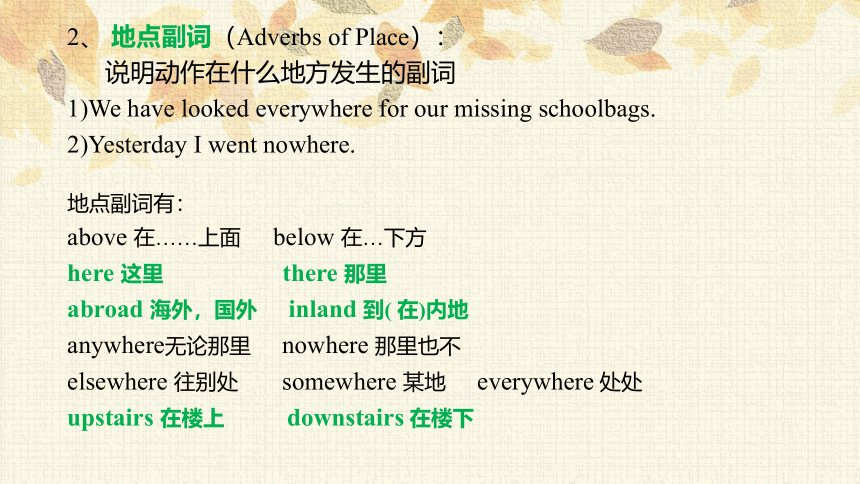
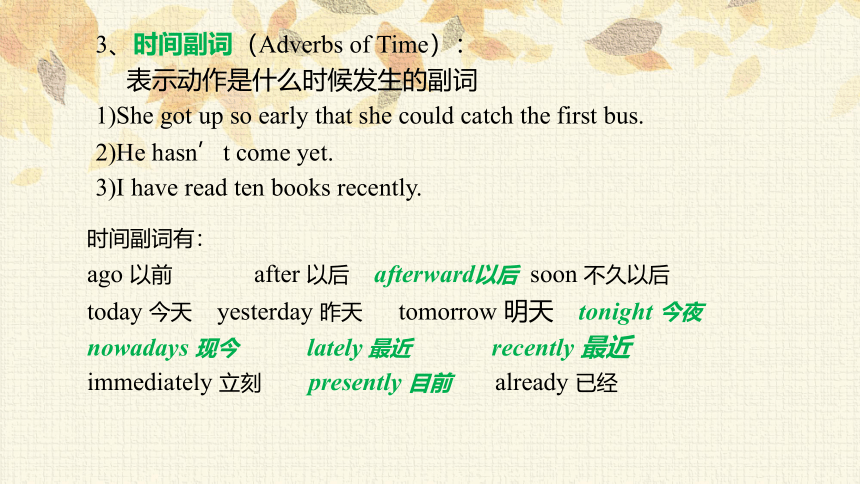
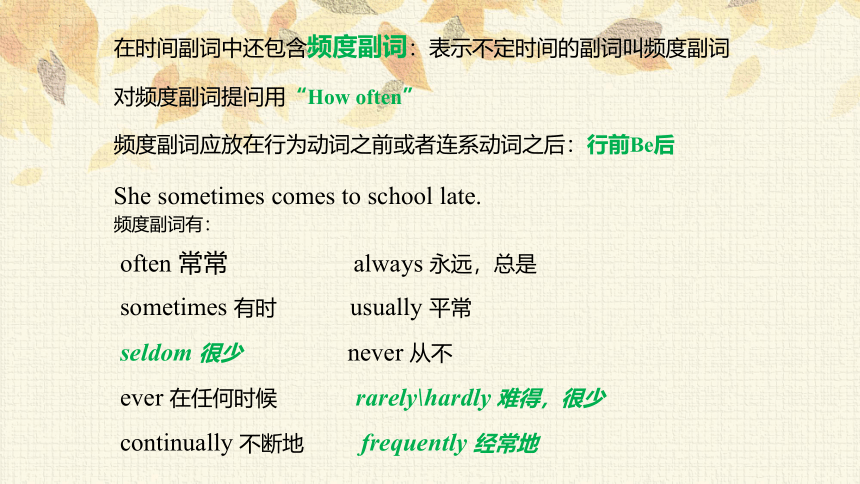
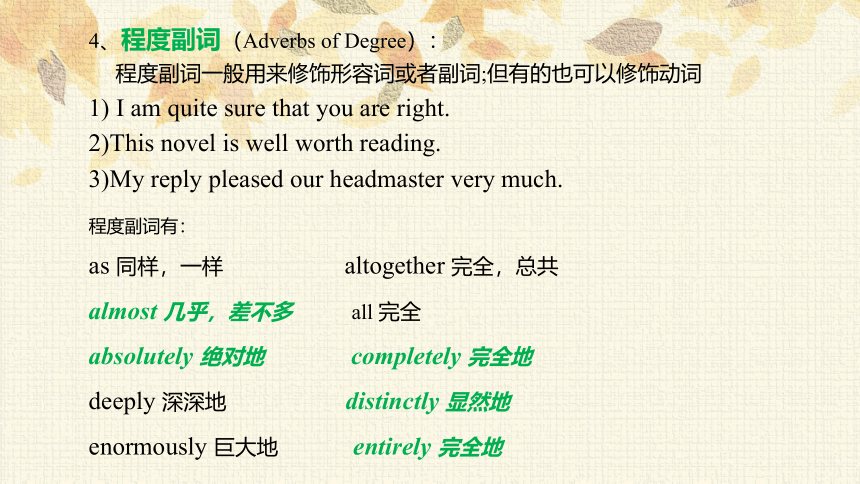
文档简介
(共34张PPT)
副词
Adverbs
Part 1
Part 2
Part 3
基本用法
比较级&最高级
练习
Part 1
基本用法
作用
作状语,用来修饰动词,形容词,其它副词或整个句子,说明时间,地点,程度,方式等。
1)Look at the photo carefully.
2)You’re driving too fast.
2、作表语,主要指主语的状态等。
1)The meeting is over.
2)Is the radio on or off
【注】
在通常情况下,用作表语时不用副词而用形容词
如可说 The woman is beautiful.
而不说 The woman is beautifully.
3.作宾语,副词用作宾语的用法十分有限,通常只用作介词宾语
1) It’s hot in here.
2) I’ll stay at home tonight.
4.作补语,说明宾语或主语所处的位置、状态等,可作宾补和主补
1)Ask him in, please.
2)We must try to help him through.
5.作定语,主要为表示时间或地点的副词,词作定语时应后置
1)The people there were very friendly.
2)Do you know the people downstairs
3)The shops around are very cheap.
1、方式副词(Adverbs of Manner):
表示“怎样做”的副词叫作方式副词
1)Let’s go to the cinema together.
2)We will finish this task easily.
3)My little brother behaved badly.
常用的方式副词有:
anyhow actively slowly immediately finally
calmly late early carefully quickly quietly
分类
2、 地点副词(Adverbs of Place):
说明动作在什么地方发生的副词
1)We have looked everywhere for our missing schoolbags.
2)Yesterday I went nowhere.
地点副词有:
above 在……上面 below 在…下方
here 这里 there 那里
abroad 海外,国外 inland 到( 在)内地
anywhere无论那里 nowhere 那里也不
elsewhere 往别处 somewhere 某地 everywhere 处处
upstairs 在楼上 downstairs 在楼下
3、时间副词(Adverbs of Time):
表示动作是什么时候发生的副词
1)She got up so early that she could catch the first bus.
2)He hasn’t come yet.
3)I have read ten books recently.
时间副词有:
ago 以前 after 以后 afterward以后 soon 不久以后
today 今天 yesterday 昨天 tomorrow 明天 tonight 今夜
nowadays 现今 lately 最近 recently 最近
immediately 立刻 presently 目前 already 已经
在时间副词中还包含频度副词:表示不定时间的副词叫频度副词
对频度副词提问用“How often”
频度副词应放在行为动词之前或者连系动词之后:行前Be后
She sometimes comes to school late.
频度副词有:
often 常常 always 永远,总是
sometimes 有时 usually 平常
seldom 很少 never 从不
ever 在任何时候 rarely\hardly 难得,很少
continually 不断地 frequently 经常地
4、程度副词(Adverbs of Degree):
程度副词一般用来修饰形容词或者副词;但有的也可以修饰动词
1) I am quite sure that you are right.
2)This novel is well worth reading.
3)My reply pleased our headmaster very much.
程度副词有:
as 同样,一样 altogether 完全,总共
almost 几乎,差不多 all 完全
absolutely 绝对地 completely 完全地
deeply 深深地 distinctly 显然地
enormously 巨大地 entirely 完全地
5、关系副词(Relative Adverbs):
用来引导定语从句,在从句中作状语1)This is the place where I used to live.
2)I don’t know the time when they left for Canada.
3)If you tell me where you come from, I will give you some useful information.
6、常用的连接性副词:
though 一般用于句末,意为“然而,可是”,表示转折。
meanwhile 意为“与此同时;在此期间”,表示两个动作同时发生。
therefore/thus/ consequently 意为“因此,所以”,表示结果。
moreover/ furthermore/ additionally 意为“此外”,表承接关系。
besides意为“除此之外,而且”,表示递进关系。
however意为“然而”,表示让步、转折。
instead意为“相反”,表示相反的情况。
anyway/anyhow意为“尽管如此;至少”,表示让步。
7、疑问副词(Interrogative Adverbs):
用来提出问题的副词
1)Where did you put my book
2)How did you go there
肯定和否定副词有:
No 不是的
Not 不 never 从不
certainly 当然,一定 surely 一定
naturally 自然 obviously 明显
willingly 乐意地 surely 肯定
decidedly 坚决地 indeed 确实
evidently 明显地 absolutely 绝对
8、句子副词:修饰整个句子,表示说话人的看法
1)Luckily,she was at home when I called on her.
2)Surprisingly, she was married to her classmate.
构成:大部分副词是由形容词+后缀构成的
1. 一般直接在词尾+ ly;
quick-quickly; sad-sadly
2. 以“辅音y, 读音为/i/”结尾,把 y 改为 i,再+ ly,
如:happy-happily; heavy-heavily;
angry-angrily; busy-busily
以“元音y, 读音为/ai/”,直接+ly,
如: dry-dryly; shy---shyly
一、规则变化
3. 绝大多数以e结尾的形容词直接+ly,
如:polite-politely; wide-widely; wise-wisely; nice-nicely
少数以e结尾的形容词,要去掉e再加-ly,
如: true-truly; due-duly
4. 绝大多数以le结尾时,去e 直接+ y,
如:simple-simply;considerable-considerably;terrible-terribly
gentle-gently;possible-possibly;probable-probably;incredible-incredibly
少数以le结尾时,直接+ly,
如:sole-solely 但是 whole-wholly 例外
5. 以-al结尾时,直接+ly,
如:actual-actually; mental-mentally
以-ll结尾时,只须+y,如:dull-dully; full-fully
6. 以ic结尾的词,加ally,
如:economic-economically;basic-basically;
scientific-scientifically;automatic-automatically;
energetic-energetically
但是 public-publicly 例外
二、不规则变化
形副一致:
far
early
late
straight
hard
fast
high
long
enough
同根副词,意义有别
just 正好
late 迟、晚
near 近
hard 努力地
most 最
justly 公正地
lately 最近
nearly 几乎
hardly 几乎没有
mostly 主要地
close(距离近)→closely 亲密地
deep(深)→deeply 深奥地 强烈地
wide(宽度)→widely 广泛地 普遍地
high(高)→highly 标准高地
可形可副,+ly为副词但表抽象意义
He dived deep into the water(具体)
I was deeply moved by his heroic deeds(英雄事迹) (抽象)
The bird is flying high in the sky(具体)
He was highly thought of by the students (抽象)
He opened his eyes wide.(具体)
English is widely used in the world(抽象)
以ly结尾,实际是形容词
friendly 友好的 lovely 可爱的 lively 活泼的
lonely 孤独的 likely 很可能的
silly 傻的,无聊的 ugly 丑陋的
daily 每日的 weekly 每星期的 monthly yearly
smell-smelly adj.发臭的, 有臭味的
mother→motherly 母亲般的 father→fatherly 父亲般的
sister→sisterly 姐妹般的 brother→brotherly 兄弟般的
3.在某些介词或地点名词加后缀-wards构成,表示“向……”
backward(s) 向后 forward(s) 向前,前进
upward(s) 向上 downward(s) 向下
southward(s) 向南 northward(s) 向北
inward 向内,向中心 outward 向外
2、部分名词加-ly变为副词。如:part→partly(部分地)
1. 修饰V.词时,多数副词放在be动词、助动词或情态动词之后,实义动词之前; 如果实义动词后有宾语,则放于宾语之后。
1) I am also Bush.
2) I can also do that.
3) I also want to play that game.
4) I get up early in the morning every day.
位置
3. 修饰形容词时,一般放在被修饰词之前,但enough除外
1) He did it quite well.
2) It's rather difficult to tell who is right.
3) He didn't run fast enough to catch the train.
2. 频度副词放在be动词、助动词或情态动词之后,实义动词之前
1) I often help him these days.
2) I always remember the day when I first came to this school.
3) You couldn't always help me.
4. 疑问副词,连接副词,关系副词以及修饰整个句子的副词,通常放在句子或从句的前面
1) When do you study everyday
2) Can you tell me how you did it
3) The students were reading when the teacher came into the classroom.
5. 时间副词和地点副词在一个句中, 地点副词在前面,时间副词在后面
1) We went shopping in the supermarket at 9 o'clock yesterday.
2) What were you doing in the classroom yesterday afternoon
3) The accident took place in the Eleven Avenue one hour ago.
6.否定副词在句首,句子要部分倒装 Never have I felt so excited!
Part 2
比较级&最高级
比较级、最高级
1. 一般单音节词,直接加er,est
2.多音节词前加more,most
soon---sooner---soonest
beautifully---more beautifully---the most beautifully
early---earlier---earliest
一、规则变化
注意:
形容词的最高级前要用定冠词the,
副词的最高级前可用可不用定冠词the.
Mount Qomolangma is the highest in the world.
Jim jumped (the) highest of the all.
原级 比较级 最高级
well better best
badly worse worst
little less least
much more most
far farther/further farthest/further
二、不规则变化
Part 3
练习
用恰当的词填空
1.It rains (heavy) today than yesterday.
2.A young girl is crying (bitter) there.
3.Jane jumped (high) than other girls.
4.He plays the piano (well) in his class.
5.We can’t hear you. You have to speak (loud).
6.Which season do you like (good).
Thank you
副词
Adverbs
Part 1
Part 2
Part 3
基本用法
比较级&最高级
练习
Part 1
基本用法
作用
作状语,用来修饰动词,形容词,其它副词或整个句子,说明时间,地点,程度,方式等。
1)Look at the photo carefully.
2)You’re driving too fast.
2、作表语,主要指主语的状态等。
1)The meeting is over.
2)Is the radio on or off
【注】
在通常情况下,用作表语时不用副词而用形容词
如可说 The woman is beautiful.
而不说 The woman is beautifully.
3.作宾语,副词用作宾语的用法十分有限,通常只用作介词宾语
1) It’s hot in here.
2) I’ll stay at home tonight.
4.作补语,说明宾语或主语所处的位置、状态等,可作宾补和主补
1)Ask him in, please.
2)We must try to help him through.
5.作定语,主要为表示时间或地点的副词,词作定语时应后置
1)The people there were very friendly.
2)Do you know the people downstairs
3)The shops around are very cheap.
1、方式副词(Adverbs of Manner):
表示“怎样做”的副词叫作方式副词
1)Let’s go to the cinema together.
2)We will finish this task easily.
3)My little brother behaved badly.
常用的方式副词有:
anyhow actively slowly immediately finally
calmly late early carefully quickly quietly
分类
2、 地点副词(Adverbs of Place):
说明动作在什么地方发生的副词
1)We have looked everywhere for our missing schoolbags.
2)Yesterday I went nowhere.
地点副词有:
above 在……上面 below 在…下方
here 这里 there 那里
abroad 海外,国外 inland 到( 在)内地
anywhere无论那里 nowhere 那里也不
elsewhere 往别处 somewhere 某地 everywhere 处处
upstairs 在楼上 downstairs 在楼下
3、时间副词(Adverbs of Time):
表示动作是什么时候发生的副词
1)She got up so early that she could catch the first bus.
2)He hasn’t come yet.
3)I have read ten books recently.
时间副词有:
ago 以前 after 以后 afterward以后 soon 不久以后
today 今天 yesterday 昨天 tomorrow 明天 tonight 今夜
nowadays 现今 lately 最近 recently 最近
immediately 立刻 presently 目前 already 已经
在时间副词中还包含频度副词:表示不定时间的副词叫频度副词
对频度副词提问用“How often”
频度副词应放在行为动词之前或者连系动词之后:行前Be后
She sometimes comes to school late.
频度副词有:
often 常常 always 永远,总是
sometimes 有时 usually 平常
seldom 很少 never 从不
ever 在任何时候 rarely\hardly 难得,很少
continually 不断地 frequently 经常地
4、程度副词(Adverbs of Degree):
程度副词一般用来修饰形容词或者副词;但有的也可以修饰动词
1) I am quite sure that you are right.
2)This novel is well worth reading.
3)My reply pleased our headmaster very much.
程度副词有:
as 同样,一样 altogether 完全,总共
almost 几乎,差不多 all 完全
absolutely 绝对地 completely 完全地
deeply 深深地 distinctly 显然地
enormously 巨大地 entirely 完全地
5、关系副词(Relative Adverbs):
用来引导定语从句,在从句中作状语1)This is the place where I used to live.
2)I don’t know the time when they left for Canada.
3)If you tell me where you come from, I will give you some useful information.
6、常用的连接性副词:
though 一般用于句末,意为“然而,可是”,表示转折。
meanwhile 意为“与此同时;在此期间”,表示两个动作同时发生。
therefore/thus/ consequently 意为“因此,所以”,表示结果。
moreover/ furthermore/ additionally 意为“此外”,表承接关系。
besides意为“除此之外,而且”,表示递进关系。
however意为“然而”,表示让步、转折。
instead意为“相反”,表示相反的情况。
anyway/anyhow意为“尽管如此;至少”,表示让步。
7、疑问副词(Interrogative Adverbs):
用来提出问题的副词
1)Where did you put my book
2)How did you go there
肯定和否定副词有:
No 不是的
Not 不 never 从不
certainly 当然,一定 surely 一定
naturally 自然 obviously 明显
willingly 乐意地 surely 肯定
decidedly 坚决地 indeed 确实
evidently 明显地 absolutely 绝对
8、句子副词:修饰整个句子,表示说话人的看法
1)Luckily,she was at home when I called on her.
2)Surprisingly, she was married to her classmate.
构成:大部分副词是由形容词+后缀构成的
1. 一般直接在词尾+ ly;
quick-quickly; sad-sadly
2. 以“辅音y, 读音为/i/”结尾,把 y 改为 i,再+ ly,
如:happy-happily; heavy-heavily;
angry-angrily; busy-busily
以“元音y, 读音为/ai/”,直接+ly,
如: dry-dryly; shy---shyly
一、规则变化
3. 绝大多数以e结尾的形容词直接+ly,
如:polite-politely; wide-widely; wise-wisely; nice-nicely
少数以e结尾的形容词,要去掉e再加-ly,
如: true-truly; due-duly
4. 绝大多数以le结尾时,去e 直接+ y,
如:simple-simply;considerable-considerably;terrible-terribly
gentle-gently;possible-possibly;probable-probably;incredible-incredibly
少数以le结尾时,直接+ly,
如:sole-solely 但是 whole-wholly 例外
5. 以-al结尾时,直接+ly,
如:actual-actually; mental-mentally
以-ll结尾时,只须+y,如:dull-dully; full-fully
6. 以ic结尾的词,加ally,
如:economic-economically;basic-basically;
scientific-scientifically;automatic-automatically;
energetic-energetically
但是 public-publicly 例外
二、不规则变化
形副一致:
far
early
late
straight
hard
fast
high
long
enough
同根副词,意义有别
just 正好
late 迟、晚
near 近
hard 努力地
most 最
justly 公正地
lately 最近
nearly 几乎
hardly 几乎没有
mostly 主要地
close(距离近)→closely 亲密地
deep(深)→deeply 深奥地 强烈地
wide(宽度)→widely 广泛地 普遍地
high(高)→highly 标准高地
可形可副,+ly为副词但表抽象意义
He dived deep into the water(具体)
I was deeply moved by his heroic deeds(英雄事迹) (抽象)
The bird is flying high in the sky(具体)
He was highly thought of by the students (抽象)
He opened his eyes wide.(具体)
English is widely used in the world(抽象)
以ly结尾,实际是形容词
friendly 友好的 lovely 可爱的 lively 活泼的
lonely 孤独的 likely 很可能的
silly 傻的,无聊的 ugly 丑陋的
daily 每日的 weekly 每星期的 monthly yearly
smell-smelly adj.发臭的, 有臭味的
mother→motherly 母亲般的 father→fatherly 父亲般的
sister→sisterly 姐妹般的 brother→brotherly 兄弟般的
3.在某些介词或地点名词加后缀-wards构成,表示“向……”
backward(s) 向后 forward(s) 向前,前进
upward(s) 向上 downward(s) 向下
southward(s) 向南 northward(s) 向北
inward 向内,向中心 outward 向外
2、部分名词加-ly变为副词。如:part→partly(部分地)
1. 修饰V.词时,多数副词放在be动词、助动词或情态动词之后,实义动词之前; 如果实义动词后有宾语,则放于宾语之后。
1) I am also Bush.
2) I can also do that.
3) I also want to play that game.
4) I get up early in the morning every day.
位置
3. 修饰形容词时,一般放在被修饰词之前,但enough除外
1) He did it quite well.
2) It's rather difficult to tell who is right.
3) He didn't run fast enough to catch the train.
2. 频度副词放在be动词、助动词或情态动词之后,实义动词之前
1) I often help him these days.
2) I always remember the day when I first came to this school.
3) You couldn't always help me.
4. 疑问副词,连接副词,关系副词以及修饰整个句子的副词,通常放在句子或从句的前面
1) When do you study everyday
2) Can you tell me how you did it
3) The students were reading when the teacher came into the classroom.
5. 时间副词和地点副词在一个句中, 地点副词在前面,时间副词在后面
1) We went shopping in the supermarket at 9 o'clock yesterday.
2) What were you doing in the classroom yesterday afternoon
3) The accident took place in the Eleven Avenue one hour ago.
6.否定副词在句首,句子要部分倒装 Never have I felt so excited!
Part 2
比较级&最高级
比较级、最高级
1. 一般单音节词,直接加er,est
2.多音节词前加more,most
soon---sooner---soonest
beautifully---more beautifully---the most beautifully
early---earlier---earliest
一、规则变化
注意:
形容词的最高级前要用定冠词the,
副词的最高级前可用可不用定冠词the.
Mount Qomolangma is the highest in the world.
Jim jumped (the) highest of the all.
原级 比较级 最高级
well better best
badly worse worst
little less least
much more most
far farther/further farthest/further
二、不规则变化
Part 3
练习
用恰当的词填空
1.It rains (heavy) today than yesterday.
2.A young girl is crying (bitter) there.
3.Jane jumped (high) than other girls.
4.He plays the piano (well) in his class.
5.We can’t hear you. You have to speak (loud).
6.Which season do you like (good).
Thank you
